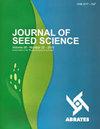注入抗坏血酸或一氧化氮能提高储存的葵花籽的发芽能力吗?
IF 1.2
4区 农林科学
Q3 AGRONOMY
引用次数: 1
摘要
摘要/ Abstract摘要:向日葵(Helianthus annuus L.)是一种重要的油籽植物,在人畜营养和多种工业应用中作为饲料。然而,油籽作为繁殖体使用时,由于变质事件导致种子生理品质(活力和活力)的丧失,需要处理活力的丧失。本文研究了水、抗坏血酸和硝普钠对向日葵杂种HELIO 251种子活力、萌发、抗氧化酶和膜完整性的影响。萌发参数显示,未处理种子(对照)延迟萌发约72 h,而所有处理种子在24 h内萌发100%。未处理种子的电解质泄漏和丙二醛水平较高,表明膜损伤程度较高。处理8 h后,过氧化氢酶和抗坏血酸过氧化物酶活性明显高于未处理种子。超氧化物歧化酶在渗吸8 h后处理间无显著差异,而在未处理的种子中,在渗吸24 h后活性最高。由此可见,抗坏血酸和硝普钠对向日葵种子萌发的促进作用较好,这可能是由于有效的抗氧化酶系统降低了活性氧的积累,从而减少了氧化损伤。本文章由计算机程序翻译,如有差异,请以英文原文为准。
Can priming with ascorbic acid or nitric oxide improve the germinability of stored sunflower seeds?
Abstract: Sunflower (Helianthus annuus L.) is a relevant oilseed species used as feed in human and animal nutrition and in multiple industrial applications. However, oilseeds need to deal with the loss of vigor when used as a propagule, due to loss of seed physiological quality (viability and vigor) caused by deterioration events. We have evaluated in the present study the effects of seeds priming techniques (water, ascorbic acid, and sodium nitroprusside) on vigor, germination, antioxidant enzymes and membrane integrity of stored sunflower hybrid HELIO 251 seeds. Germination parameters showed that non-primed seeds (control) delayed germination in almost 72 h while all primed seeds germinated 100% in 24 h. Electrolyte leakage and malondialdehyde levels were higher in non-primed seeds indicating higher degree of membrane damage. An increase in the activity of catalase and ascorbate peroxidase was also observed after 8 h of imbibition of primed seeds compared to non-primed seeds. Regarding superoxide dismutase, there was no significant differences between treatments after 8 h of imbibition, whereas the highest activity was after 24 h of imbibition in non-primed seeds. Therefore, it can be concluded priming with ascorbic acid or sodium nitroprusside exhibited better performance in germination of stored sunflower seeds, probably resulting from lower accumulation of reactive oxygen species and consequent reduced oxidative damage due to an efficient antioxidant enzyme system.
求助全文
通过发布文献求助,成功后即可免费获取论文全文。
去求助
来源期刊

Journal of Seed Science
Agricultural and Biological Sciences-Agronomy and Crop Science
CiteScore
2.00
自引率
30.00%
发文量
28
审稿时长
12 weeks
期刊介绍:
From 2017 the Journal of Seed Science (JSS) will circulate online version only.
Original scientific studies and communications, not yet published or submitted to another journal for publication and written in Portuguese or English, will be accepted for publication. For manuscripts submitted in English, the authors should provide an adequated version.
The SCIENTIFIC COMMUNICATION is a category of scientific manuscript which describes a technique, an equipment, new species or observations and surveys of limited results. It has the same scientific rigor as the “Scientific Articles” and the same value as a publication. The classification of a manuscript as a SCIENTIFIC COMMUNICATION is based on its content and scientific merit but it can be a preliminary study, simple and not definitive on a certain subject, with publication justified by its uniqueness and contribution to the area.
The Editorial Board of the JSS may invite leading authors of recognized reputation to compose specific Review Articles covering topics of their specialization that will convey to the scientific community the state-of-the-art knowledge related to the specific theme.
 求助内容:
求助内容: 应助结果提醒方式:
应助结果提醒方式:


